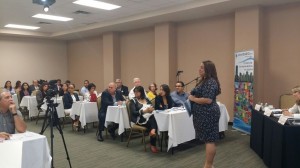As election day nears in Florida, the talk turns to absentee ballot fraud

By Marianela Toledo | Florida Watchdog
MIAMI — As Election Day nears, absentee ballot fraud will likely be in Florida’s news headlines once again.
Carolina Lopez, spokeswoman for the Miami Dade Department of Elections, said staff there can determine if the person requesting a ballot is the one who actually receives it, but can’t control what happens to that ballot after that.
BE AWARE: During the workshop, organized by Miami Diario, reporters where asked to keep voters informed to avoid fraud.
“It is important for voters to understand the full electoral process to avoid scammers wanting to fill out their ballots and influence their decisions on the ballot questions,” Lopez says.
Miami Diario and political blog Political Pasion are stepping in to help. They organized the Political Workshop for Hispanic Journalists in Florida with the goal of spreading this message: Absentee ballot fraud threatens to undermine democracy.
The workshop Tuesday in Miami Springs helped reporters learn more about how the issue affects Sunshine State voters.
“There are a lot of Hispanic journalists who don’t understand the politics of (Florida),” said Marianela Méndez, director of MiamiDiario.com. “It is important to know what we are going to do, how are we are going to do it, what are the informative venues we need in order to inform the Hispanic (voter) where to go, and what to do with their votes.”
Absentee ballot fraud has plagued Florida elections for years. In 1998, Florida Department of Law Enforcement chronicled multiple abuses starting as far back as 1984.
In 2012, two people were arrested and sentenced for having multiple absentee ballots in their possession. Then in 2013, a congressmen’s aide was sentenced to 90 days in prison for masterminding a plan using illegal absentee ballots to get his boss more votes.
Joe Carrillo, the private detective who broke the 2012 absentee ballot fraud case, said absentee ballots are the Holy Grail to fraudsters. “Two hundred thousand absentee ballots were delivered last time (for the primary election Aug. 26), but only 100,000 were returned (meaning they were filled out legitimately and returned to the Department of Elections.) What happened to the other 100,000?” he asks.
“That is how elections are stolen in Miami Dade County,” Carrillo said.
He said scammers request absentee ballots through the Internet and falsify request forms because it’s less risky than going door to door.
“Now ballot brokers (people who collect fraudulent absentee ballots) are afraid of going out in the street asking people — most of them elderly who don’t know anything about the electoral process — for their ballots,” Carrillo said.
“This is a long-term problem in Florida,” said Hans von Spakovsky, senior legal fellow at Heritage Foundation. “I don’t think much has been done since the 1998 (Department of Law Enforcement) report came out to fix the problem.”
Von Spakovsky said one solution is to request a copy of a photo ID when a voter requests an absentee ballot.
“That will make it much more difficult for people trying to get the absentee ballot of other voters,” he added.
Duplicate voter registrations (voters who register in more than one place) has also been a problem in Florida since there is no national registration list.
Lopez said that when someone registers to vote in Miami Dade the paperwork is cross-checked by the Florida Department of Elections. But as Watchdog.org reported in July, the system is fraught with errors.
Von Spakovsky said Florida is one of the states registered on the Interstate Voter Crosschecking Program, a program originating in Kansas that allows participating states to cross-reference voter lists with other member states.
WATCH OUR VIDEO IN SPANISH







